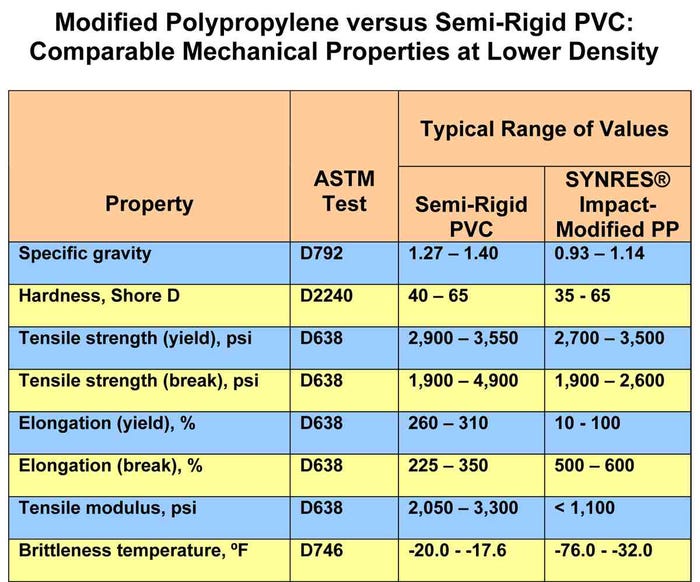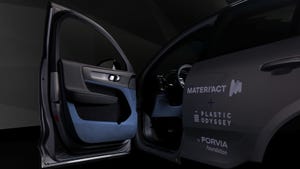This iteration of Material Thoughts, our look at recent developments in plastics, compounds and additives, considers a new fatty food-approved TPE from PolyOne, two small news items regarding PEEK, why a PP compound may be able to replace PVC in some applications, and a new project to develop TPVs based largely on renewable resource materials.
May 31, 2011
This iteration of Material Thoughts, our look at recent developments in plastics, compounds and additives, considers a new fatty food-approved TPE from PolyOne, two small news items regarding PEEK, why a PP compound may be able to replace PVC in some applications, and a new project to develop TPVs based largely on renewable resource materials.
|
The table compares typical properties of semi-rigid PVC and Synres 1000 Series compounds over a range of hardnesses. |
First to plastics compounder and supplier PolyOne, whose GLS business unit for thermoplastic elastomers (TPEs) last month at the Chinaplas trade show introduced Versaflex FFC 2882-87,a new TPE grade that meets both China's regulatory requirement GB4806.1-94 and U.S. Food and Drug Administration (FDA) n-hexane extraction requirements under 21 CFR §177.2600.
"To help manufacturers create products that meet both GB and FDA requirements for fatty food contact, we've developed a new grade of Versaflex FFC TPE," explained Rick Noller, director of global marketing. "Our goal was to develop regulatory-compliant materials that could help our customers gain a significant competitive edge by increasing the ability of their final products to pass increasingly tougher regulatory hurdles."
Target applications for the new Versaflex FFC TPEs include kitchen utensils, such as flexible spatulas and blender covers, gaskets for food storage containers, and baby bottle nipples.
The company reports that additional grades that comply with Chinese and U.S. fatty food contact requirements are currently under development.
In other news Victrex Polymer Solutions, a supplier of polyaryletherketones (PAEK) and a division of Victrex plc, which is better known for supplying related high-temp thermoplastic polyether etherketone (PEEK), announced it is building a second technical center in Asia. The new Japan Technical Center (JTC) will join current Victrex technical centers in China and the U.K.
In other PEEK news Basel, Switzerland-based Dolder AG will take over the marketing of the Vestakeep grades of PEEK produced by Evonik Industries (Essen, Germany). The marketing activities will focus in particular on small-volume sales in Europe. Dolder already had been Evonik's distribution partner for Vestakeep molding compounds in Austria, Switzerland and Germany.
At custom compounder Teknor Apex Company, a new mineral-filled polypropylene (PP) compound is being marketed as an effective alternative to semi-rigid PVC for those applications where PVC is no longer an option. Synres 1000 Series compounds have been modified so that they are essentially semi-rigid materials, with mechanical properties comparable to those of PVC in the 40 - 65 Shore D hardness range, plus good low-temperature toughness and resistance to environmental stress cracking. PP has greater thermal stability than PVC and so these compounds also offer improved processability, according to the company, which also is a significant supplier of PVC compounds.
"Synres 1000 Series compounds cost more per pound than the widely used PVC workhorse materials they would replace, but part of the price difference is offset by a greater volume yield," said Stephan Pronovost, business director for the compounder's specialty compounding division. Pronovost. "Because their average density is lower than that of semi-rigid PVC materials, one pound of a Synres compound yields more finished product."
Typical applications for semi-rigid PVC for which the company recommends Synres 1000 Series compounds as alternatives include cove bases and moldings in building and construction, protective edges, and "U" and "J" profiles. Teknor Apex supplies the compounds in natural or pre-colored form in formulations tailored to customer requirements.
Finally, the Federal Ministry for Education and Research (BMBF) is funding a research project this year at the Southern Germany Plastics Center (SKZ; Würzburg) aiming to develop a new class of thermoplastic vulcanizates (TPV) consisting of more than 90% renewable materials. The SKZ is working with bioplastic compounds developer Tecnaro and Schleich GmbH, a supplier of materials testing equipment.
Besides the formulation of the new TPV, the project includes optimization of the processing of these (via injection molding, extrusion, etc.) and preparation of a screening life cycle assessment (LCA) for the new materials.
About the Author(s)
You May Also Like



